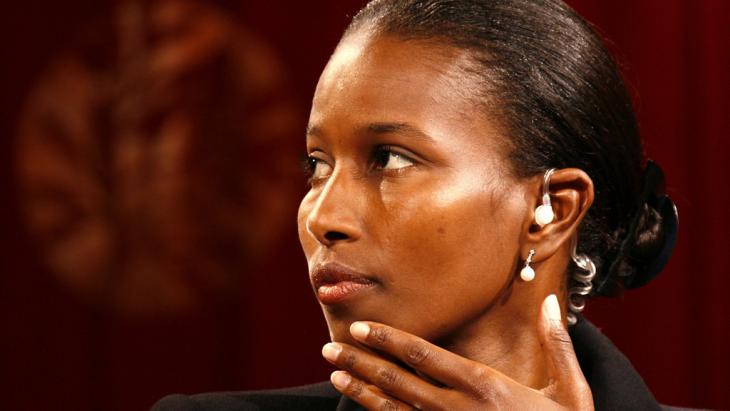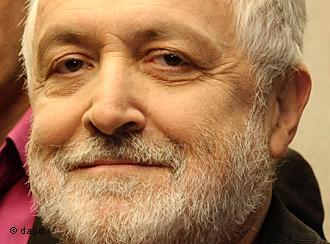Hailed as a "female Luther"

The book industry has been doing well since the rise of Islamic State and the attacks on "Charlie Hebdo". Barely a week goes by without the appearance of new books with chilling covers featuring masked figures, machine guns and some sort of flag emblazoned with Arabic characters.
Almost everyone – all the experts, critics, observers and whatever else they care to call themselves – is desperately trying to jump on this moving "Orient Express", a bandwagon that's heading in the direction of profit and self-aggrandisement, once the prejudices of the western majority society have been pandered to – yet again.
Someone who has done exactly this – for the umpteenth time – is Ayaan Hirsi Ali, whom some may regard as the world's best-known "critic of Islam". Her book "Heretic" (German title: "Reformiert euch!") appeared on the shelves in Germany just a few weeks ago, a work that has been positively received by both the US and German media.
The cultural programme "Titel, Thesen, Temperamente" on ARD, Germany's first public television channel, ran a lengthy feature that was trailed with the story of her supposedly horrific past. Hirsi Ali was also given a platform on the programme "Forum am Freitag" on ZDF, Germany's second public television channel, and on the public radio broadcaster Deutschlandfunk. At no point did anyone offer up any basic criticism of Hirsi Ali as a supposed reformer, instead she was praised as a "female Luther", who would soon bring redemption to the Muslims, yes, all 1.5 billion of them. That the real Luther was a fervent anti-Semite who called upon people to set fire to synagogues, is a fact that appears to have been forgotten long ago.

Islam as a "destructive, nihilistic death cult"
Mind you, when it comes to prejudices and uncompromising attitudes, Ayaan Hirsi Ali could definitely give the real Luther a run for his money. It is Ali's view that Islam, which she has described among other things as a "destructive, nihilistic death cult", must "be conquered". As she says in an interview with the US magazine "Reason": "There comes a moment when you crush your enemy."
On the subject of Anders B. Breivik, the right-wing extremist and Islamophobic terrorist who killed 77 people in Norway in July 2011, Hirsi Ali once absolved him of all blame saying that he had "been forced" to act the way he did. Breivik was not to blame for the mass murder, she said, but rather this lay at the door of the "defenders of multi-culturalism". "He had no other choice but to use violence," said Hirsi Ali at an event held at the Axel Springer publishing house in Berlin in the year 2012, when she received a special award. Her remarks were greeted with thunderous applause. In his 1,500-page pamphlet, Breivik quoted Ayaan Hirsi Ali as well as authors such as Henryk M. Broder, who also applauded with great enthusiasm in the front row at the award ceremony in Berlin.
Ali has gradually relocated to the United States in recent years. This is hardly surprising when one considers that she lost all credibility in her adopted nation, the Netherlands. The explanation is quite simple: she was busted by a Dutch documentary series that investigated Ali and her story in 2006. The series revealed that pretty much everything that Ayaan Hirsi Ali had told Dutch authorities upon arrival in the Netherlands and repeated on numerous occasions in the media, was entirely fictitious.
Ayaan Hirsi Ali, whose actual name is Ayaan Hirsi Magam, immigrated to the Netherlands in 1992. Once there, not only did she give a false name and age, she also constructed a web of lies that would go on to have a decisive impact on her later career. At the time, Somali-born Hirsi Ali claimed to have fled the civil war in Somalia. In actual fact, she had already left the country before the outbreak of this conflict and had been a student at a respected Muslim school for girls in Kenya. Her attendance at the school had been financed by the United Nations. In other words, she had been in a secure environment; she had never experienced a war like the one that later broke out in Somalia.
A house of cards built on a foundation of lies

The stories about her family were equally fictitious. Hirsi Ali's husband, who had financed her "escape" to Europe and whom she later divorced without any problems, visited her several times at the refugee centre where she lived at the time. She also remained in touch with her family after the divorce. Her brother even attended a Christian school. None of these details fit the picture of the brutal Islamist family alleged to have threatened her with violence and "honour killing". But thanks to her story, Hirsi Ali was quickly granted asylum. "Yes, I made it all up," Hirsi Ali openly admitted on camera after her house of cards had totally collapsed.
Shortly after the publication of the documentary about her, Hirsi Ali – who had in the meantime begun to carve out a political career in the right-wing liberal People's Party for Freedom and Democracy (VVD), the former party of staunch Islam critic Geert Wilders – gave up her parliamentary seat. The revelations about her lies made headlines in the Dutch media and also endangered her citizenship. She then took up a position in the US at the American Enterprise Institute, a Washington-based neo-conservative think tank also regarded as a key rallying point for those responsible for the invasion of Iraq that disregarded international law.
Those who otherwise rallied around Hirsi Ali in the US were first and foremost those issuing vehement calls for an aggressive US foreign policy in the Middle East and who believe they are fighting a "War on Islam". These also include representatives of what's known as the "New Atheists" movement, who may issue harsh criticism of all religions, but who appear primarily intent upon stigmatising Islam.
Coincidentally, her arguments always go hand in hand with those of the architects of war at the White House. Whether drone attacks or torture in Guantanamo – they claim that all this is justifiable, as the US is morally superior to the "savage barbarians", or in other words the Afghans or the Iraqis. The philosopher Sam Harris, one of the best-known proponents of the radical movement, writes among other things that it is ethically legitimate to kill some people because of their faith, if this faith should be too dangerous. Harris is primarily referring here to Muslims. He has said on numerous occasions that the US is not fighting a "War on Terror", but a "War on Islam". Those holding a different view on this matter have been described by Harris as "fascists", among other things.
That a war such as George W. Bush's crusade in Iraq, which has claimed the lives of more than a million people, has had a radicalising effect on some people and is paving the way for chaos, has apparently been ignored not only by Hirsi Ali and Co., but also by those mainstream media that continue to court self-promoters like her, present her invented past as the truth and take her every word at face value. Little wonder, because this is the easiest thing to do. The constructed black-and-white picture remains intact, the stereotypes are pandered to and everyone counts themselves lucky. But absolutely nothing is resolved, let alone reformed, in this manner.
Emran Feroz
© Qantara.de 2015
Translated from the German by Nina Coon
